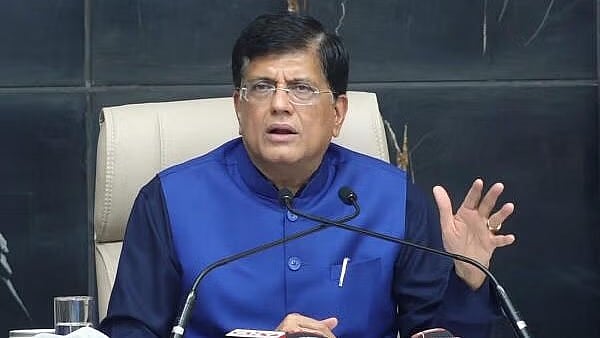
Union Minister Piyush Goyal
Credit: PTI File Photo
Union minister Piyush Goyal lauded Prayagraj Mahakumbh, an example of ‘Ek Bharat Shrestha Bharat’ which “will take the country to new heights”. He, however, lampooned Indian startups at the Delhi Startup Mahakumbh for not rising to the heights their Chinese counterparts have achieved.
Indian startups’ fascination with delivering groceries in 10-15 minutes, instead of innovating deep technology, disappoints him: “When I look at deeptech, the numbers are a disturbing sign….are we looking at dukaandari or are we looking to complete globally with our innovations?”. Venting in the same vein, he asked: “Are we going to make ice-creams or [semiconductor] chips?”
Goyal has problems with e-commerce startups employing Indian youth at low wages: “What are Indian startups doing today? We are focussed on food delivery apps, turning unemployed youth into cheap labour so that the rich can get their meals without moving out of their houses”.
Lack of domestic capital in startups also frustrates him: “…I only wish that they had more India investors rather than foreigners buying all of our startups”.
Goyal is the industries and commerce minister, responsible for making startup policies and programmes. The Government of India has, on innumerable occasions, claimed credit for making India the third largest startup ecosystem in the world.
Is the Indian startup system doing badly? Are startups only responsible for the issues he highlighted? What is the role policy playing?
E-commerce v/s deeptech
India’s 40 million physical wholesalers and retailers — dukaandaars in Goyal’s terminology — have played and still play a big and valuable economic role in bringing production and consumption together.
Indian e-commerce and fintech startups have made enormous contributions by making the dukaandari/trading more efficient, convenient and cheaper by using the power of digital technologies and contributing numerous entrepreneurial innovations. This has made the life of consumers much better, though it has put the income of dukaandaars, the traditional supporters of Goyal’s party, at a major risk.
India’s policy has sought to protect the dukaandaars. Foreign direct investment (FDI) has been restricted to only e-commerce platforms. FDI in the manufacturing of high-tech consumer products has been discouraged by conditioning it on high domestic value addition. Unfortunately for Goyal, the challenge in food and grocery deliveries is coming from domestic startups, making the battle between Indian startups v/s traditional retailers now.
Every innovation, technological or entrepreneurial, and investment in any sphere of economic activity (making high-tech equipment or building e-commerce platforms) must be welcomed.
Instead of castigating the startups, the minister should focus on making policies to encourage all investments, foreign and domestic, in e-commerce to build a competitive ecosystem to serve consumers and facilitate the transition of physical retailers to modern e-commerce.
Cheap labour
The government has lauded startups for creating jobs. A PIB release read: ‘Start-ups have created over 17.28 lakh direct jobs as of December 2024’. Food, grocery, and other e-commerce startups have emerged as the largest job-creators.
Delivery agents of food startups earn around Rs 15,000 per month/ Rs 1.8 lakh per annum. While this is a little less than per capita net national income of Rs 2.06 lakh, it is comfortably higher than the average per capita private consumption of Rs 1.45 lakh. Moreover, most startup jobs, not only support living of many unemployed youth in urban areas, but also finance their studies/examinations.
These jobs do not deserve to be pitied. Instead, Goyal should direct his ire at the millions of wageless jobs which India is creating.
PLFS 2023-2024 claims India created 8.4 crore jobs in agriculture and 5.9 crore jobs of ‘unpaid labour in household enterprises’ between 2017-2018 and 2023-2024. These jobs, accounting for over 88% of all jobs created, were really disguised unemployment or ‘wage-less jobs’.
Startup jobs are far better than these wageless jobs.
Lagging domestic investment
Goyal is laying the blame at the wrong door for the drought of domestic investment in startups.
The government has been taxing capital investment in startups, made by Indian investors, (notoriously known as angel tax). Only in the July 2024 Budget was this mindless tax removed, albeit with prospective effect, leaving thousands of pending cases hanging over startups’ shoulders. Ironically, foreign investment in Indian startups remained exempt. Many issues about the taxation of startups profits (and losses) still await resolution.
The government also controls the purse-strings. Public sector banks, the Life Insurance Corporation, infrastructure investment banks, etc., risk-averse as they are, have stayed away from providing even loans to startups.
Two alternate investment funds (AIFs), established by the government to invest in startups through the Fund of Fund (FoF) mechanism, have disbursed only a pittance, and that too through a slow griding process.
Get the policy right
Indian startups are indeed generating considerable GDP and creating valuable jobs in large numbers. Let us respect that. The startups have not been as successful in high-tech areas, and neither have the Indian mainstream companies been.
Indian Investors have enthusiastically invested in initial public offers (IPOs) of Indian startups listing on the stock exchanges. This suggests enormous demand for startup stocks. This enthusiasm can be tapped at the pre-listing stages as well, provided the government gets the policy right and creates a conducive taxation, investment, and entrepreneurial environment.
(Subhash Chandra Garg is former Finance & Economic Affairs Secretary, and author of ‘The Ten Trillion Dream Dented’, ‘Commentary on Budget 2025-2026’, and ‘We Also Make Policy’.)
Disclaimer: The views expressed above are the author's own. They do not necessarily reflect the views of DH.